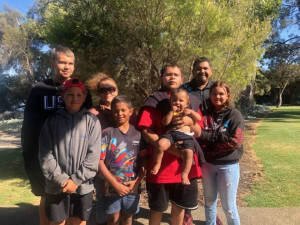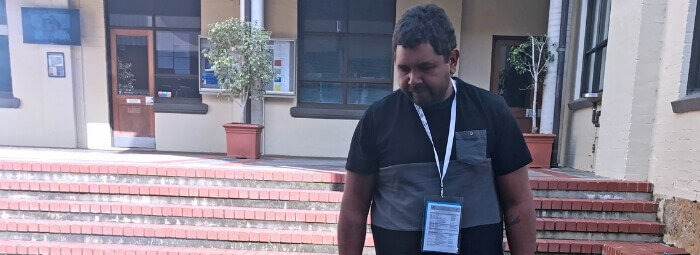When the Uniting Church WA gathers, we often share in a Welcome to Country or an Acknowledgment of Country. Both are significant ways the church can acknowledge the Traditional Custodians of the land, but there are some important differences.
A Welcome to Country is only led by Traditional Custodians; whereas an Acknowledgment of Country can be led by anyone, and acknowledges the Traditional Custodians of that place. A Smoking Ceremony is a process of cleansing and healing, which can also take place with a Welcome.
Mitchell Garlett is a candidate for Ministry and member of the Uniting Aboriginal and Islander Christian Congress WA. He’s a proud Noongar family man, and the son of the late Rev Garlett. You may have seen him at Uniting Church WA events leading a Welcome to Country or a Smoking Ceremony. He said a Welcome to Country is an important time. It allows the Traditional Custodians of that place to welcome and acknowledge those present, and it allows those present to respect the land and culture of the First Peoples.
“A Welcome to Country is to welcome people to the land of the Traditional Custodians of the area, and also to thank the ancestors for allowing meetings, events or whatever it is to take place in that area,” he said.
“We have the white fella welcome where they welcome everybody. The Noongar way of welcome is to allow [Second Peoples] to listen and to have respect for the Noongar ways and their connection to the land and to our ancestors – to the spiritual side of our ways.
“It’s important to do Welcomes for people who do not know Noongar ways or have an understanding. It gives them the opportunity to listen with respect and to be a part of allowing our ways to be your ways, in treating our land with respect and listening to our language.”
Mitchell said that traditionally, a Welcome to Country would be shared with any people who were travelling or visiting land outside of their own nation. They would also serve to warn people about unsafe areas on the land, or advise them where they could find necessities.
“Welcomes would usually be involved in the old days. People who come as visitors, as part of that welcome they would be shown areas that are safe to be travelled through and areas that are not. Visitors would be told about food in the area, where to find water, all that sort of stuff.
“Our Noongar way of understanding is to share with visitors who come to this place.”
When Mitchell leads a Welcome to Country, he pays respect to God, his ancestors, and the land.
“The first thing we’d normally say would be to give thanks to our creator, giving thanks to God,” he said. “The second thing is that we pay our respects to our Elders, including our ancestors that have gone before us. Without them our language, our culture, our ways wouldn’t have been able to still be alive today.
“The other important thing is to the land, our Mother Earth, for the provisions that we get from it.
“We can’t have one without the other, they all connect to each other in our belief system.”
A Welcome to Country is led by a First Nations Elder from that land. An Elder, however, does not necessarily have to be an older person, but can be a person who holds the knowledge and wisdom to be a leader.
Mitchel learnt to be a First Nations leader by listening and respecting his Elders, including his Dad, Rev Garlett.
“It all started when I was very young, and it came from my Dad,” he said. “I didn’t get this out of books, it was something that I learnt from listening – and it was important for me to know.
“I hold onto that knowledge and wisdom, but for me as a younger person I know that I’ve got Elders that I can go to that have rights over me, out of respect.”
When First and Second Peoples share in a Welcome to Country, they are not only respecting the land and culture of the Traditional Custodians of that place, but keeping the culture alive.
“Our Aboriginal history and our culture was denied its existence,” Mitchell said. “In doing [Welcomes to Country], this is one way for us to maintain and restore our cultural practices that were given to us from our creator.
“For non-Indigenous people, they can learn about the ways that we deeply feel and care for our land – our relationship to the land.
“That relationships is a very spiritual and very sacred connection. These Welcomes, they need to be heard and they need to be respected.”
Heather Dowling
Top image: Mitchell Garlett leading a Smoking Ceremony before a Welcome to Country at a Meeting of the Synod of WA.

